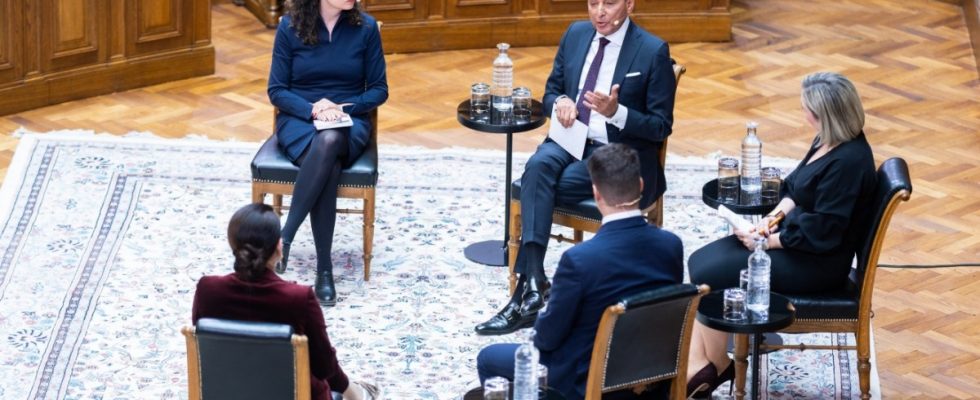A commemoration ceremony for the liberation of the Mauthausen concentration camp took place in the Austrian parliament, the Nationalrat, on Friday, a democratic ritual in a building that was used as the seat of Vienna’s Gau administration during the Nazi era. As usual at this commemoration, the politicians did not sit separated by color. But mixed. Greens, conservatives, social democrats and the right-wing populists from the FPÖ. With no way of avoiding the sharp words that Michel Friedman, child of Holocaust survivors, had brought with him for them and for their symbolized political togetherness in today’s Vienna.
“Everyone is someone” – this sentence by the writer George Tabori is a “wonderful translation of a legal language into a cultural one,” Friedman, 67, began. In Austria, however, this claim to respect for every human being is being disregarded today by a party that says instead : “Some are nobody – or at least second and third class people”. The FPÖ, which he did not explicitly mention by name – “democratically elected, which does not make the party democratic” – relies on “election campaigns that are clearly played with racist narratives”. But that alone is not the reason why he, Friedman, thought for a long time “whether I would accept the invitation” to today’s Austrian parliament.
Many have gotten used to the FPÖ – not Friedman
Because there is also the ÖVP, the conservative people’s party, which has already formed a coalition with the right-wing populists twice. (At the local and state level, the Social Democrats also occasionally form a coalition with the FPÖ. Friedman was silent about it.) That helps to “kosher” this party, Friedman said, that is, to give it the stamp of harmlessness. Twenty years ago, Friedman, then Vice President of the Central Council of Jews in Germany and President of the European Jewish Congress, spoke at a protest rally on Vienna’s Heldenplatz against the cooperation between the ÖVP and FPÖ at the Vienna cabinet table – unsuccessfully. In the years since, many have gotten used to it, it seems. And some don’t.
There was only restrained applause in the National Council for Friedman’s request “that we look at each other” – in the case of the FPÖ, that is, to take a closer look and to judge harshly – “because we are the witnesses of our time”. Green and red top politicians, sitting next to FPÖ members, are also linked to the ÖVP in coalitions. On the other hand, hatred abounded. And fast. The Viennese FPÖ country leader Dominik Nepp poisoned via Twitter against the “coking Paolo Pinkel” – an allusion to Friedman’s contacts with prostitutes under this pseudonym, which were exposed in 2003, which ended Friedman’s public career at the time. Former FPÖ leader Jörg Haider used to parry criticism from the Jewish side in a similar way. For example, when he dismissed the chairman of Vienna’s Jewish community, Ariel Muzicant, with the words: “I don’t understand at all how someone named Ariel can have so much dirt on his back.”
Friedman now has a second career. After 2003 he withdrew completely, studied philosophy and did his doctorate in it. In the meantime, he, who, in addition to his work as a lawyer with his own law firm in Frankfurt am Main, is also active as a television presenter again, appears more cautious. But no less clear. After the arson attack on a refugee home in Rostock-Lichtenhagen in 1992, Michel Friedman and Ignatz Bubis, then President of the Central Council, drove there together and stood by the refugees. Unlike the then Chancellor Helmut Kohl, whose CDU Friedman nevertheless belonged to and still belongs to today.

